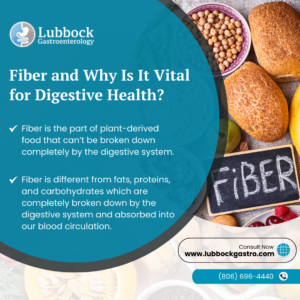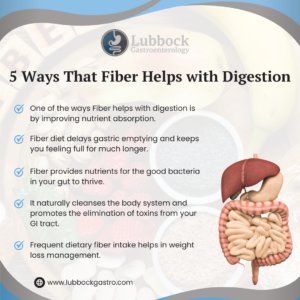Fiber and Why Is It Vital for Digestive Health?

Fiber and Why Is It Vital for Digestive Health
Fiber is the part of plant-derived food that can’t be broken down completely by the digestive system. It is also known as roughages. Fiber is different from fats, proteins, and carbohydrates which are completely broken down by the digestive system and absorbed into our blood circulation.
Fiber is classified into two categories, which are soluble and insoluble. Soluble fiber dissolves in water, taking on a gel-like consistency, hence the term soluble fiber. Insoluble fiber does not easily dissolve but rather absorbs water, and helps add bulk to the intestines. Most plant-based foods contain both soluble and insoluble fiber.
Fiber is important to digestive health because it maintains regular bowel function. Dietary fiber is responsible for the bulking up of stool, making it easier for stool to travel through the colon. This helps reduce the possibility of occurrence of constipation. Insoluble fiber helps reduce the occurrence of diarrhea by restraining water in the gut.
For a Longer Life and Happier Gut, Eat More Fiber
One of the best things to do for a happier gut and a longer life is to eat more fiber. Getting enough fiber in your diet helps you regulate your bowel movements, and stabilize a healthy weight. Monitoring your diet is essential when you’re concerned about weight loss. So, get a journal to document and count your calories and grams of added sugars, fats, proteins, and carbs.
The role of dietary fibers is often underestimated. Scientists have long discovered that eating fiber is good for health. To help Americans get into the habit of consuming enough fiber, the Academy of Nutrition and Dietetics has recommended daily intake of 25 grams of fiber for women, or 21 grams if over 50 years old and 38 grams for men, or 30 grams if over 50. Research has associated dietary fiber with eradicating certain diseases and reducing the risk of a range of conditions, including type 2 diabetes, food allergies, and even knee arthritis. It’s not more about eating a “high-fiber” diet, it’s more about eating more fiber. Not getting enough dietary fiber into your body significantly changes the way your gut functions.
Good Fiber, Bad Fiber – How The Different Types Affect You
There are two main types of dietary fiber; namely soluble and insoluble fiber. The soluble fiber readily dissolves in water and breaks down into a gel-like substance in the large intestine and is digested by bacteria to release calories and gasses. Insoluble fiber does not dissolve in water. It remains intact as food moves through the gastrointestinal tract. Because insoluble fiber is not digested at all, it is not a source of calories.
Both types of fibers have their unique benefits as well as similar benefits. The major benefits of soluble fiber include lowering fat absorption and helping with weight management, lowering cholesterol levels, stabilizing blood sugar levels and reducing the risk of cardiovascular disease. The benefits of insoluble fiber range from preventing constipation to lowering the risk of diverticular disease and reducing the risk of colorectal cancer.
How Does Fiber Help Your Digestive Health?
Fiber helps your digestive health by normalizing bowel movements. It regulates the movement of the bowels and softens the stool, making excretion easier. Dietary fibers increase the weight of the stool and bulky stool is easier to pass, decreasing your chance of constipation. Fibers also help with loose stools, helping to solidify the stool. Incorporating a high-fiber diet may lower your risk of developing hemorrhoids and small pouches in your colon, as well as lower your risk of colorectal cancer.
5 Ways That Fiber Helps with Digestion

5 Ways That Fiber Helps with Digestion
The different ways fiber helps with digestion include:
Better Absorption of Nutrients
One of the ways fiber helps with digestion is by improving nutrient absorption. Consumption of fiber delays the digestion process and allows the body to absorb more nutrients from the food you eat.
Keeps The Stomach Fuller for Longer
Adding more fiber to your diet adds bulk to your food and slows down digestion. Fiber diet delays gastric emptying and keeps you feeling full for much longer.
Promotes Healthy Gut
Rather than spending money on probiotics and probiotics supplements to promote the health of your gut, dietary fiber will do that at a minimal cost. Fiber provides nutrients for the good bacteria in your gut to thrive.
Natural Detoxification
Dietary fiber serves a natural detoxification purpose. It naturally cleanses the body system and promotes the elimination of toxins from your GI tract. Soluble fiber soaks up potentially harmful compounds before the body and the insoluble fiber can absorb them limits the amount of time that chemicals stay in the body system.
Healthy Weight Loss
Frequent dietary fiber intake helps in weight loss management. Research has shown that people who ate more fiber after losing weight weighed less than those who ate less.
How to Eat More Fiber — and 5 Reasons Why You Should
It’s very important to eat more fiber: There are a wide variety of fiber sources such as fruits, vegetables, whole grains and many others. Incorporate fiber into your breakfast, lunch, dinner as well as snacks. Whole grains are the best form of fiber. Consider eating whole grains instead of refined grains. Whole grains have the germ and bran intact, making them more nutritious than refined grains. The following are reasons why you should eat more fiber.
Control blood sugar levels.
Dietary fibers are suitable for controlling blood sugar levels, especially in people with diabetes. Soluble fiber delays the absorption of sugar and helps improve blood sugar levels.
Lowers cholesterol levels
Studies have shown that high-fiber foods lower cholesterol levels and this has positive heart-health benefits, including the reduction of blood pressure.
Help lower disease risk
In addition to reducing the cholesterol level in the body, eating more fiber also lowers the risk of many diseases, including obesity, cardiovascular disease, diabetes, metabolic syndrome and others.
Increase satiety
Soluble fiber slows down how quickly foods are digested, and insoluble fiber physically fills up space in the stomach and intestines. This allows one to attain satisfaction quickly and keeps you off unnecessary snacking.
Boosts lifespan
Studies have shown that increasing your dietary fiber intake can help you live longer because dietary fiber is associated with a reduced risk of dying from cardiovascular disease and some other diseases, thereby boosting lifespan.
Pros and Cons of a High-Fiber Diet for Digestive Health
A high-fiber diet is associated with a lot of benefits and just a few disadvantages.
Pros of High Fiber Diet For the Digestive System
- Fiber aids in achieving a healthy weight. Soluble fiber can help you lose excess weight and achieve a healthy weight by suppressing your appetite. Fiber reduces appetite by slowing down the movement of food through the gut.
- Fiber helps you live longer. Studies have shown that if you meet the recommended daily fiber intake, you will be able to prevent several diseases and live a healthy long life.
- Fiber reduces the risk of colorectal cancer. Whether one is at risk of colorectal cancer or not, eating more fiber can help minimize the risk of colorectal cancer.
- Fiber eliminates toxins found in the gastrointestinal tract. Dietary fiber serves as an ideal alternative for detox juices. Fiber gets rid of toxins and eliminates any dangerous compounds in your body that could affect your health status.
- Fiber serves as a source of nutrition for the “good” bacteria in your gut. Fiber isn’t digested in the stomach like other foods. It passes through the stomach to the colon and becomes food for the beneficial bacteria in the gut.
Cons of High Fiber Diet For the Digestive System
- The laxative effects of fiber vary. Some fibers reduce constipation while some others can increase constipation.
- The gas and bloating associated with dietary fiber can be quite uncomfortable.
- Insoluble fiber like cellulose can scrape the gut lining making it fragile and allowing things like endotoxins to enter the bloodstream.
- Excessive amounts of fiber can cause symptoms such as constipation, discomfort, and nausea.
- Too much fiber intake may cause nutrient deficiencies
FAQ
How Does Fiber Help Digestion?
Fiber helps digestion in many ways. It regulates bowel movements, improves nutrient absorption, and decreases constipation.
How Much Fiber Should You Eat Daily?
Experts recommend a total dietary fiber intake of 25 to 30 grams per day, with about one-fourth (6 to 8 grams) per day obtained from soluble fiber.
When to see a gastroenterologist doctor?
You should see a gastroenterologist if you have any signs or symptoms of gastrointestinal tract disorder. You can also schedule an appointment to screen your gastrointestinal tract.
Should you avoid fiber when you feel bloated?
Consuming too much fiber is associated with bloating. It’s normal to feel bloated after consuming fiber. Bloating is an uncomfortable situation. Incorporate fiber into your diet and drink a lot of water while taking fiber.
